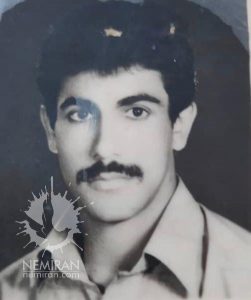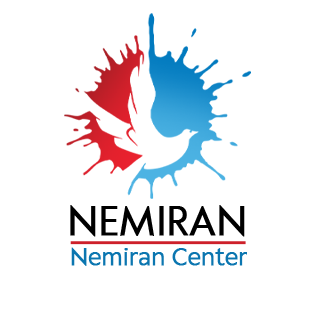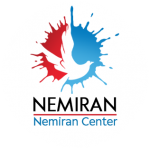Drops of blood were running across the faces and on the cheeks of the mothers and sisters.
The unbearable heat of summer had diminished a little. Little by little, the autumn winds began to blow with dust. But in a mourning corner of Kurdistan, the heat, dust, and winds were like whips in the hands of executioners which tore the aching and lifeless bodies of Kurdish victims to pieces. All this was mixed with the cries of men and women who had lost their loved ones, a huge horrible crime committed the government of ignorance and clerical crime.
Brutal kicks, slaps like whips, excruciating pain fell on the bodies of the burnt hearts with each blow of the executioners’ baton. A deafening and annoying voice came from the guns of the executioners and perpetrators of the Islamic Republic that had snatched the power from the tired body and soul of those oppressed and grieving people.
Drops of blood were running across the faces and on the cheeks of the mothers and sisters. They mourned their innocent children, brothers and sisters. Those tender cheek and embossed faces were covered in blood under the summer sun and autumn dust. It was very difficult to recognize the persons.
Sad and tired fathers and brothers were on the other side. Their psyche was like an erupting volcano after losing their loved ones. With empty hands and without fear they attacked the criminal forces and the executioners of the government of the Islamic Republic who were armed to the teeth. Those executioners brutally punched, kicked and stabbed the bodies of the bereaved people, wounded their faces and bodies as well as their hearts and souls. It was one of the darkest and most bitter days of those families.
After two and a half hours of fierce resistance against the executioners of the clerical government, finally, under the pressure and threat and brutality of the repressive forces of the regime, those tired and suffering people were forced to bury their loved ones who were shot by the perpetrators of the regime in the Laanat Abad cemetery of Urmia. They returned to Mahabad with mourning hearts and teary eyes. In the buses, it was the cries of the mothers and sisters which deafened the heaven ears. Screams wounded to the heart of every listener. A man with a white beard among the crowd shouted: “We could open one of the graves, I recognized Hossein.”

Terrible silence reigned on the bus. It seemed to last for years. A woman fell unconscious from a bus seat. She was the sister of Hossein Peyembernejad.
The life of Hossein ended that way, one of the members and activists of Komala in the city of Mahabad. After enduring the most brutal and cruel tortures, Hossein was executed in the prison of the clerical regime along with one of his brothers named Musa, as well as 32 innocent Kurdish girls and boys in the city of Urmia. Their bodies were buried in the cemetery of the same city named by the regime as the Cursed Cemetery.
The death of Hossein Peyembernejad was a severe blow against Komala and freedom fighters against the clerical and ignorance regime, and it took some time for them to fill the vacancy of this brave man. Hossein’s influence in the struggle was so great that Komala radio and media spoke and wrote about him in detail. His loss was a heavy and irreparable loss for Komala and the Kurdish people. Hossein was very dear, lovable and active among his comrades and companions. A high-ranking member of Komala named (Rahim Rash) went secretly to Mahabad after Hossein’s execution in the winter of the same year, despite many dangers and even the possibility of arrest by agents and mercenaries of the regime. On behalf of the Komala Party and Hossein’s comrades, he went to his family, expressed respect and appreciation. He said that it was a huge loss for Komala.
Hossein Peyembernejad was born on 24/8/1334 Iranian Calendar (16/11/1955) to a middle-class family in the city of Mahabad .His father is Seyed Ismail and his mother is Zubaida Sirvani. He had a calm and firm character. The contentment of his parents, family and friends was the priority of his life. He behaved like a mature and experienced man, although he was young. Hossein finished high school. While studying, he worked in his spare time to support his family. He became acquainted with poverty, discrimination, class differences in the process of his work. His knowledge about these issues motivated him to step on the path of freedom and equality.
Hossein was active during the people’s struggle against the monarchy. After the revolution, he joined the Komala party to counteract the crimes of the clerical regime due to his liberal and egalitarian ideas. He contributed to demanding freedom and to counteract against oppression. Helping and guiding people who wanted to combat the regime and to join the ranks of Komala and identifying the mercenaries and perpetrators of the clerical regime were his activities. Hossein was arrested and imprisoned for three months in the summer of 1361 (1982). They could not force him to confess despite severe torture. He was then released. He was ambushed by the mercenaries of the Islamic Republic in the winter of the same year on a cold and icy night. He narrated later that he fell to the ground several times when he tried to escape from the armed forces, because the ground was frozen. He survived the barrage of bullets fired by those men. He hid in a house in the neighborhood for a few days. After that, he reached one of the Komala bases in the village Haji Alikand and stayed there for a while. He was sent to Mahabad city again to carry out covert and reconnaissance operations. He had several successful activities against the usurping mercenaries of the Islamic Republic.
Hossein Peyembernejad was arrested on the night of 1/3/1362 (22.05.1983) after a brutal attack by the forces of the regime on his house, along with his younger brother Karim. He was subjected to the most severe and barbaric torture. Hossein sent his shirt secretly out of prison full of blood-stained as sign of the torture.
The presence of this piece of clothing in our home was always a reminder of those pains and tortures. A great pain engulfed the whole family whenever we looked at it. Looking at it again was like pouring salt on a wound that will never heal. It was years before my mother agreed to bury this last memento of Hossein, just as his tormented body was buried in his blood.
Author: Ali Peyembernejad, brother of executed brothers Hossein, Karim and Musa.

